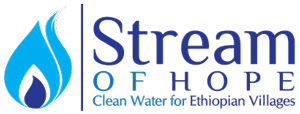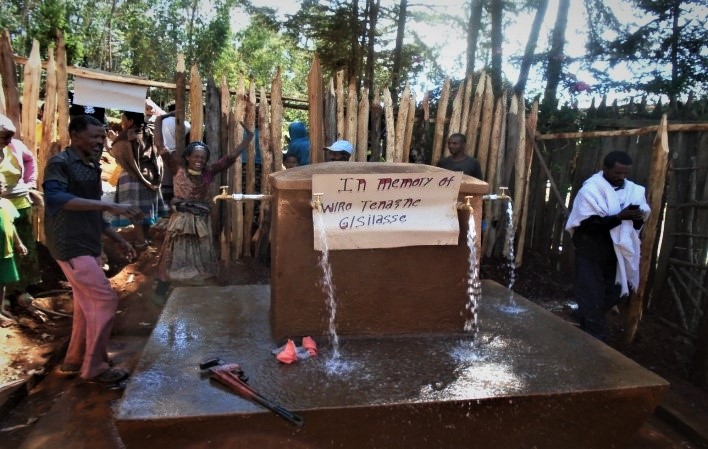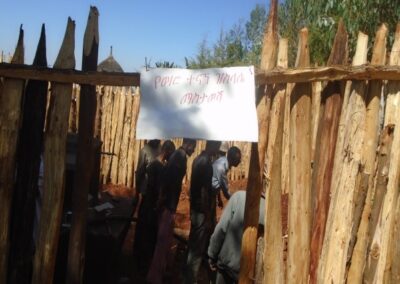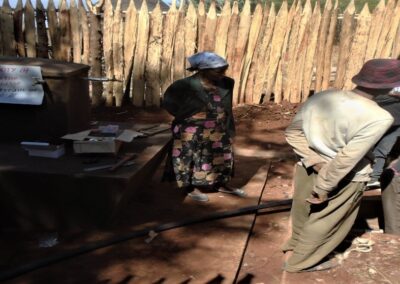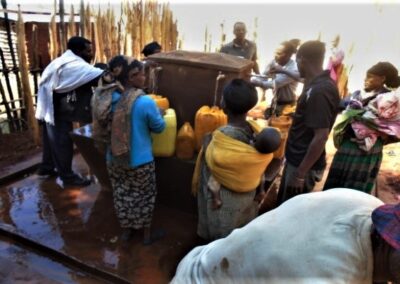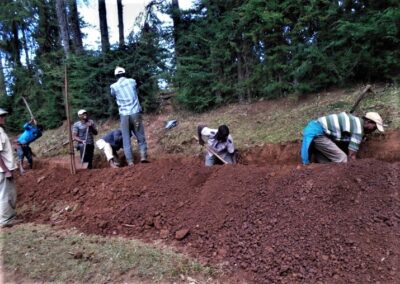Mochiye gravity flow expansion WASH project implementation was planned to provide water access for one rural village. The existing project first implemented by kale hiwot church and expansion had been made in different periods by the government. The existing water supply scheme has a Spring capping structure, Two 25m3 reservoirs,15 water points, and 15km pipe of various sizes and has been giving service to 3000 people with effective management of the community water management board.
This project is found in Cheha woreda, Guraghe zone of Southern Nations Nationalities, and people’s regional state. It is located at an average distance of 200kms SW of Addis Ababa. This expansion project covers one rural village of Yejoka Keble namely lay Geshe which has problems associated with a lack of safe and adequate water supply at a reasonable distance. The total population that will directly benefit from the project is 230 at present. The gender proportion of the beneficiaries is 107 men and 123 women.
This project was done in memory of W/ro Tenagne Gebre Silassie Silase, who was a longtime supporter of Stream of Hope Inc The project aims to provide safe and adequate water to people, to promote the use of improved sanitation services and safer hygiene practices, and to build the capacity of the community, especially on women empowerment to manage the scheme and carry out other development activities by themselves. The project has been implemented within Four Months from September 2017 – December 2017 with a total financial cost of Birr 193,374.60 of which 40,000 Birr is community contribution in Labor work and the remain Birr 153,374.60 was covered by donor partner Stream of Hope Inc. The project construction was built and managed by Ethiopian Catholic Church Emdibir Eparchy Social and Development Coordination Commission Office of Emdibir(EmCS – SDCO of Emdibir)
Project Results:
- Construction of 1 water point
- Construction of 2 Valve Chamber
- Supply and Installation of 1 km HDPE Pipe with the necessary fittings
- Safe, adequate, and reliable potable water available at reasonable distances and 15 liters per capita per day regularly consumed 230 people (107men and 123 women) in the target area for drinking, cooking, and personal hygiene.
- Daily workload and time spent on fetching water reduced and girls/women in the target area can fetch water within a maximum of 15 minutes.
- 230 people (107 men and123 women) have access and use improved sanitation facilities and practice safer personal hygiene activities.
- The communities could manage the water scheme by themselves and at least One-third of the committee members are women and use the acquired capacity to better manage the water scheme.
- Establishing Community-based Organization and conducting training for new Water Point Committee members, Care Takers, and Refreshment training for existing Water Association members in Two Round.
- Capacity Building Training For women to empower them and to create equal representation.
Mobilization of the community in all steps of the project implementation like fencing for the constructed water point and any other labor-intensive activates and Performing 1km trench excavation work with the full participation of the community
